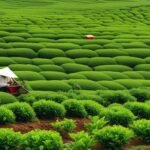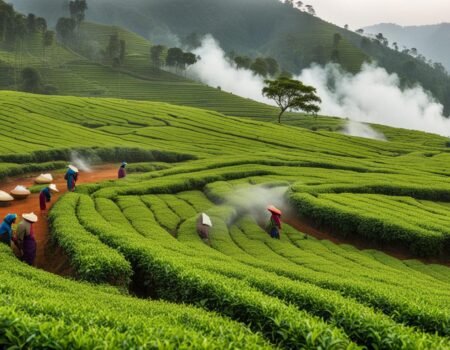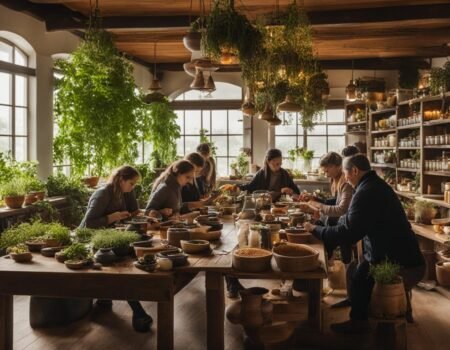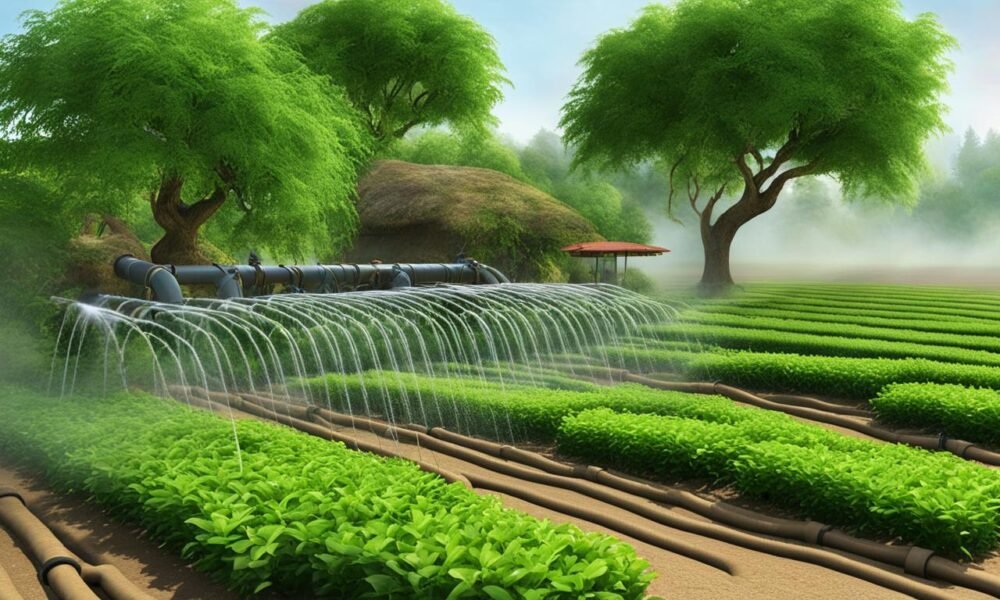
Essential Equipment for Tea Cultivation: Recommendations
Growing tea is an art that requires the right tools and equipment to ensure a thriving tea garden. Whether you’re a seasoned tea farmer or just starting out, having the essential equipment can make all the difference in the quality and productivity of your tea plants. From irrigation systems to pruning tools, here are our top recommendations for tea cultivation equipment:
Key Takeaways:
- Invest in quality irrigation systems to provide adequate water supply for your tea plants’ growth.
- Choose efficient pruning tools to maintain the shape, health, and productivity of your tea garden.
- Consider tea leaf processing equipment to enhance the efficiency of processing harvested leaves.
Tea Cultivation Drone Technology for Monitoring and Analysis
Tea cultivation has embraced the advancements in technology, and one such innovation that can greatly benefit tea farmers is drone technology. Drones equipped with high-resolution cameras offer an aerial perspective of tea gardens, enabling farmers to monitor and analyze various aspects of their crops. These drones can capture detailed images that help assess the health of the plants, identify signs of diseases or pests, and monitor growth patterns.
Not only do drones provide visual insights, but they also gather essential data on environmental factors. By flying over tea gardens, drones can collect information on soil moisture levels, temperature variations, and other crucial parameters. This data offers valuable insights into the overall health of the tea garden and enables farmers to make informed decisions about irrigation, nutrient management, and crop protection.
The use of drone technology for tea farm monitoring systems can significantly enhance efficiency and productivity in tea cultivation. Farmers can detect potential issues at an early stage, allowing them to take proactive measures and prevent crop losses. Moreover, the data gathered by drones can be analyzed and integrated with other monitoring systems, enabling comprehensive and data-driven management strategies for tea gardens.
Embracing drone technology in tea cultivation is not only a practical solution but also an exciting opportunity for tea farmers to stay at the forefront of agricultural innovation. By harnessing the power of drones, tea farmers can improve crop yields, optimize resource utilization, and ensure the overall health and sustainability of their tea gardens.
Soil Testing Kits for Tea Gardens
Ensuring the optimal growing conditions for tea plants requires a thorough understanding of the nutrient composition and pH level of the soil in tea gardens. This is where soil testing kits specifically designed for tea cultivation come into play. These kits provide tea farmers with the ability to analyze soil samples and make informed decisions about soil management.
By using soil testing kits, tea farmers can determine if the soil requires any amendments, such as adding fertilizers or adjusting the pH level. These kits provide valuable insights into the quality of the soil, allowing tea farmers to optimize the growing conditions for their tea plants.
Key Benefits of Soil Testing Kits for Tea Gardens
Using soil testing kits offers several key benefits for tea farmers:
- Accurate Nutrient Analysis: Soil testing kits provide precise measurements of essential nutrients required for healthy tea plant growth, such as nitrogen, phosphorus, and potassium. This enables tea farmers to ensure their plants receive the necessary nutrients for optimal growth and productivity.
- pH Level Evaluation: Tea plants thrive in slightly acidic soil, with a pH level between 6 and 6.5. Soil testing kits allow tea farmers to determine the pH level of their soil accurately. If the pH level is too high or too low, farmers can take appropriate actions to adjust it and create an ideal growing environment for their tea plants.
- Cost-Effective Decision Making: By regularly conducting soil tests with the help of these kits, tea farmers can make data-driven decisions regarding soil amendments and fertilizers, avoiding unnecessary costs and promoting sustainable farming practices.
How to Use a Soil Testing Kit for Tea Gardens
Using a soil testing kit is a straightforward process. It typically involves the following steps:
- Collect soil samples from various areas of the tea garden, ensuring representative samples.
- Follow the instructions provided with the soil testing kit to prepare the samples for testing.
- Use the kit’s testing tools to assess the nutrient composition and pH level of the soil in each sample.
- Interpret the test results and take appropriate actions, such as adjusting nutrient levels or pH, based on the recommendations provided with the kit.
- Repeat the soil testing process regularly to monitor changes in soil conditions and adjust the tea garden’s management accordingly.
By incorporating soil testing kits into their tea cultivation practices, tea farmers can optimize the growing conditions for their tea plants, leading to healthier plants, increased productivity, and higher-quality tea yields.
| Benefits of Soil Testing Kits for Tea Gardens | How to Use a Soil Testing Kit for Tea Gardens |
|---|---|
| Accurate Nutrient Analysis | Collect soil samples from various areas of the tea garden, ensuring representative samples. |
| pH Level Evaluation | Follow the instructions provided with the soil testing kit to prepare the samples for testing. |
| Cost-Effective Decision Making | Use the kit’s testing tools to assess the nutrient composition and pH level of the soil in each sample. |
| Interpret the test results and take appropriate actions, such as adjusting nutrient levels or pH, based on the recommendations provided with the kit. | |
| Repeat the soil testing process regularly to monitor changes in soil conditions and adjust the tea garden’s management accordingly. |
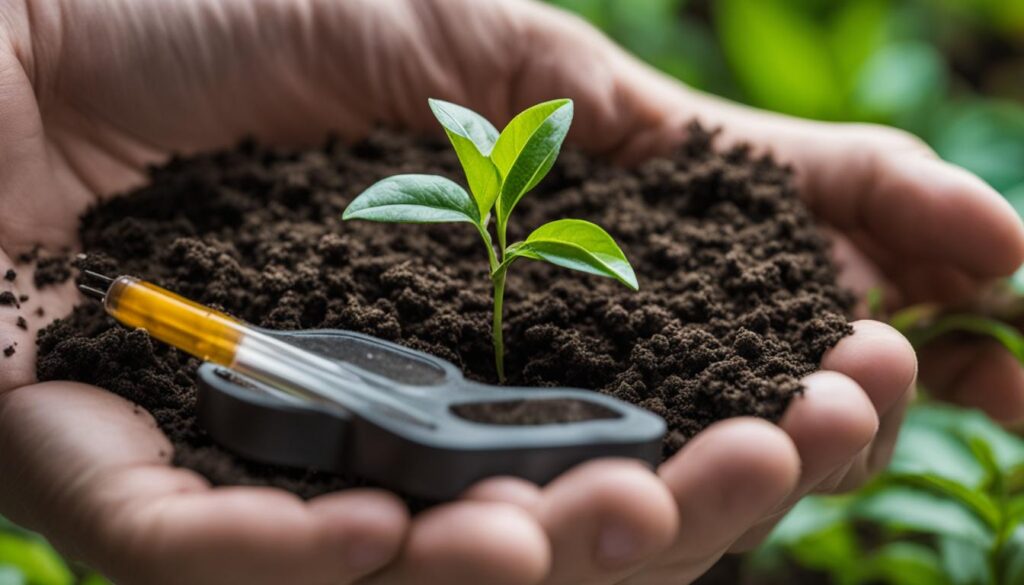
Tea Cultivation Greenhouse Equipment
When it comes to tea cultivation, having the right greenhouse equipment is crucial for creating optimal growing conditions for tea plants. Greenhouses provide controlled environments that protect tea plants from extreme weather conditions and allow cultivation in regions with unsuitable climates.
To ensure the success of your tea garden, consider investing in the following greenhouse equipment:
- Climate Control Systems: Installing heating and cooling systems in your greenhouse can help you maintain the ideal temperature for tea cultivation. These systems allow you to regulate the temperature and provide the necessary warmth during colder seasons or cool the greenhouse during hot summers.
- Ventilation Systems: Proper air circulation is essential for tea plants to thrive. Installing ventilation systems in your greenhouse helps regulate humidity levels, prevent the buildup of stagnant air, and reduce the risk of diseases caused by excessive moisture.
- Irrigation Systems: Tea plants require consistent watering to ensure healthy growth. Installing irrigation systems, such as drip or misting systems, can efficiently deliver water to the plants while minimizing water wastage.
- Shading Materials: Tea plants prefer partial shade, especially during hot summer months. Using shading materials, such as shade cloths or netting, can protect the plants from direct sunlight and prevent overheating.
“Investing in the right greenhouse equipment can significantly enhance the quality and productivity of your tea garden.”
By choosing the appropriate greenhouse equipment, you can create an environment that mimics the natural conditions tea plants thrive in, leading to healthier plants and higher yields. Remember to consider factors such as the size of your tea garden, local climate conditions, and your budget when selecting greenhouse equipment for tea cultivation.
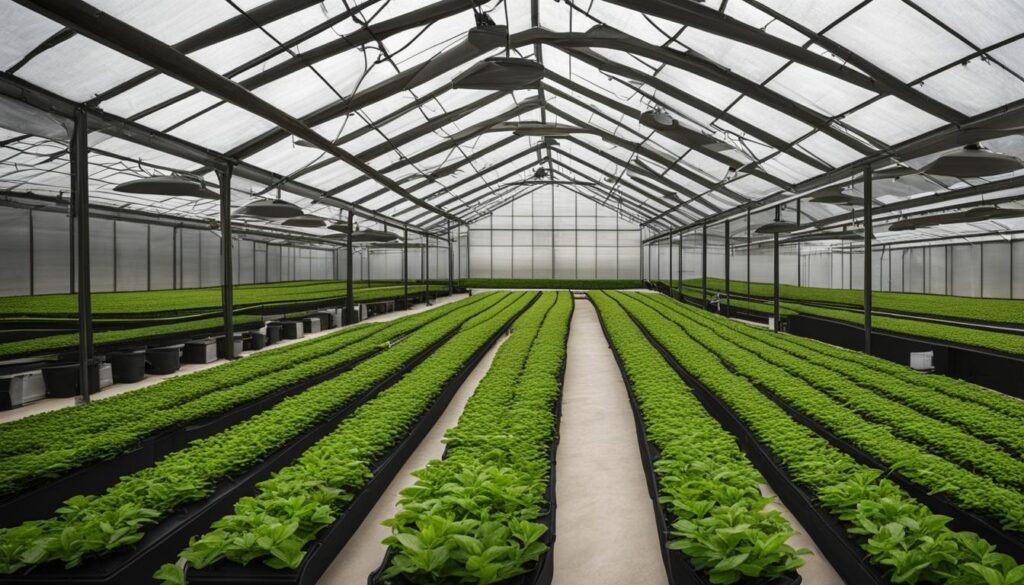
Conclusion
As tea farmers, we understand the importance of having the right equipment to ensure a successful tea cultivation journey. But it’s not just about the tools for the tea plants; we must also prioritize our safety and the proper drying of our precious tea leaves.
When it comes to safety, we cannot compromise. That’s why investing in tea cultivation safety gear is crucial. Equip yourself with sturdy gloves, broad-brimmed hats, and reliable boots to protect your hands, head, and feet during farming activities. Taking care of ourselves allows us to focus on what we love – cultivating exceptional tea.
Once we’ve harvested our tea leaves, it’s time to dry them properly to preserve their flavor and aroma. Tea leaf drying equipment, such as drying racks or dehydrators, is an essential part of the process. With the right equipment, we can ensure that our tea leaves are dried evenly and thoroughly, resulting in high-quality tea that will delight our customers.
So remember, tea cultivation is not just about tea plants and machinery; it’s about our safety and the careful processing of our tea leaves. By investing in the necessary safety gear and tea leaf drying equipment, we can enhance the quality and productivity of our tea gardens. Together, let’s continue to cultivate remarkable tea with passion and dedication.
FAQ
What equipment is recommended for tea cultivation?
Tea farmers can benefit from using drone technology for monitoring and analysis, soil testing kits for understanding the nutrient composition and pH level of the soil, greenhouse equipment for creating controlled environments, and safety gear and drying equipment for proper tea leaf processing.
How can drones be used in tea cultivation?
Drones equipped with high-resolution cameras can provide aerial views of tea gardens, allowing farmers to assess plant health, detect diseases or pests, and monitor growth patterns. They can also collect data on soil moisture levels, temperature, and other environmental factors for better crop management.
What are soil testing kits for tea gardens used for?
These kits allow tea farmers to analyze soil samples and determine if any amendments are needed, such as adding fertilizers or adjusting pH levels. Regular soil testing helps farmers make informed decisions about soil management and ensure optimal growing conditions for tea plants.
What equipment is necessary for tea cultivation in greenhouses?
Tea farmers should consider investing in climate control systems (heating and cooling), ventilation systems, irrigation systems, and shading materials to create the ideal conditions for tea plants to thrive within the greenhouse.
What safety gear and equipment are essential for tea cultivation?
Tea farmers should ensure they have safety gear such as gloves, hats, and boots to protect themselves during farming activities. Additionally, tea leaf drying equipment, such as drying racks or dehydrators, is essential for properly drying harvested tea leaves.

